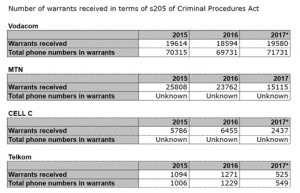
The Right2Know Campaign (R2K) has released statistics from SA's mobile operators that show government law enforcement agencies are spying on the communications of tens of thousands of phone numbers using a loophole in SA's surveillance policies.
The statistics were provided to R2K by MTN, Vodacom, Cell C and Telkom, and show law enforcement requested access to sensitive communications information from at least 70 000 phone numbers each year for the past three years. However, R2K says the actual amount of phone numbers is likely much higher.
In May, the advocacy group filed Promotion of Access to Information Act (PAIA) requests with all four operators, asking them to disclose statistics of how many warrants they received via section 205 of the Criminal Procedures Act, for the years 2015 to 2017.
R2K made the PAIA requests after a Daily Maverick report on a legal loophole showed magistrates are allowed to authorise thousands of 'surveillance operations' every year, forcing telecoms operators to hand over sensitive information about their customers' communications.
The advocacy group said this was happening parallel to the provisions of RICA (Regulation of Interception of Communications and Provision of Communication-Related Information Act).
R2K said at the time that the loophole allows law enforcement officials to bypass the RICA judge and approach any magistrate for a warrant that forces a telecoms company to give over a customer's call records and metadata if that person is under investigation. However, that person is never notified, even if the investigation is dropped or if found to be innocent.
What telcos revealed
All four telecoms operators complied with R2K's information requests and provided statistics.
Their answers show law enforcement received call records for a minimum of 70 960 phone numbers in 2016. Due to incomplete records (only Vodacom and Telkom could say how many phone numbers were contained in the warrants it received) the actual number is estimated to be much higher if you were to add the missing numbers from MTN and Cell C.

According to the statistics: in 2016, MTN received 23 762 warrants for customers' call records, while Vodacom got 18 594 warrants (which contained 69 731 numbers). Cell C got 6 455 and Telkom received 1 271.
R2K says due to the fact that in some cases, the same warrant will be sent to several service providers, it is not possible to add these numbers together to get the total number of warrants issued across all service providers, as this would result in 'double counting' of some warrants.
R2K says the most recent statistics from the RICA judge's office show that in 2014/2015, the RICA judge issued 760 warrants for interception. At a minimum, in the same year magistrates issued 25 808 warrants in terms of section 205 of the Criminal Procedures Act.
"These statistics confirm for the first time that the vast majority of 'authorised' surveillance operations are happening outside of the RICA judge's oversight, with no transparency or accountability," R2K says.
R2K believes urgent reforms are needed for SA's surveillance policies. The group is demanding an end to mass storage of customers' data and an end to SIM card registration, while urging better protection for call records.
Share